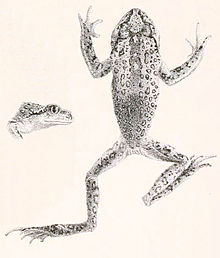Scutiger boulengeri
| Scutiger boulengeri | |
|---|---|

| |
| Illustration from the species description by Jacques von Bedriaga (1898) | |
| Scientific classification | |
| Domain: | Eukaryota |
| Kingdom: | Animalia |
| Phylum: | Chordata |
| Class: | Amphibia |
| Order: | Anura |
| Family: | Megophryidae |
| Genus: | Scutiger |
| Species: | S. boulengeri
|
| Binomial name | |
| Scutiger boulengeri (Bedriaga, 1898)
| |
| Synonyms | |
|
Leptobrachium boulengeri Bedriaga, 1898 | |
Scutiger boulengeri (common names: Boulenger's lazy toad, Boulenger's high altitude toad, Himalayan stream frog, and Xizang alpine toad) is a species of toad in the family Bufonidae. It is found in Nepal, India (Sikkim) and western China (Sichuan, Yunnan, Gansu, Qinghai, and Tibet).[2] A healthy population has been found at an elevation of 5,270 m (17,290 ft) in one of the lakes in the Gurudongmar Lake complex in Sikkimese Himalaya.[3] This is one of the highest elevations where amphibians have ever been recorded (Pleurodema marmoratum has been recorded higher at the Andes[4]).[5][6]

Description
Scutiger boulengeri males measure about 45–55 mm (1.8–2.2 in) and females about 50–62 mm (2.0–2.4 in) in snout–vent length.[3][7] The head is flat, wider than long and with a rounded snout. The eyes are protruding. The tympanum is indistinct; the supratympanal fold is present. The dorsum is olive or greenish-grey with numerous warts. The ventrum is yellowish. The fingers have no webbing whereas the toes have rudimentary webbing.[6]
Tadpoles grow to a length of about 60 mm (2.4 in).[7]
Habitat and conservation
Scutiger boulengeri is an alpine species living near streams and lakes in grassland habitats[1] at elevations of 3,300–5,270 m (10,830–17,290 ft) above sea level.[2][3] They hibernate in loose soil from September to March or April.[3]
Scutiger boulengeri is a very common species but potentially threatened by diversion of water for agriculture, pollution from agrochemicals, and overgrazing. However, it is not considered threatened overall.[1]
References
- ^ a b c Ohler, Annemarie; Sanyal, Pranabes; Fei, Liang; Lau, Michael Wai Neng (2004). "Scutiger boulengeri". The IUCN Red List of Threatened Species. 2004. IUCN: e.T57607A11661516. doi:10.2305/IUCN.UK.2004.RLTS.T57607A11661516.en. Retrieved 26 December 2017.
- ^ a b Frost, Darrel R. (2016). "Scutiger boulengeri (Bedriaga, 1898)". Amphibian Species of the World: an Online Reference. Version 6.0. American Museum of Natural History. Retrieved 21 January 2017.
- ^ a b c d Subba, Barkha; Ravikanth, G.; Aravind, N.A. (2015). "Scaling new heights: first record of Boulenger's lazy toad Scutiger boulengeri (Amphibia: Anura: Megophryidae) from high altitude lake in Sikkim Himalaya, India" (PDF). Journal of Threatened Taxa. 7 (10): 7655–7663. doi:10.11609/JoTT.o4325.7655-63.
{{cite journal}}: Unknown parameter|last-author-amp=ignored (|name-list-style=suggested) (help) - ^ Seimon, Tracie A.; Seimon, Anton; Daszak, Peter; Halloy, Stephan R.P.; Schloegel, Lisa M.; Aguilar, César A.; Sowell, Preston; Hyatt, Alex D.; Konecky, Bronwen; Simmons, John E. (2007). "Upward range extension of Andean anurans and chytridiomycosis to extreme elevations in response to tropical deglaciation". Global Change Biology. 13 (1): 288–299. doi:10.1111/j.1365-2486.2006.01278.x.
- ^ Seimon, Tracie A.; Seimon, Anton (2015). "Comment on "Scaling new heights: first record of Boulenger's Lazy Toad Scutiger boulengeri (Amphibia: Anura: Megophryidae) from high altitude lake in Sikkim Himalaya, India" by Barkha Subba, G. Ravikanth & N.A. Aravind (2015)". Journal of Threatened Taxa. 7 (11): 7849–7850. doi:10.11609/JoTT.o4396.7849-50.
- ^ a b Subba, Barkha; Ravikanth, G.; Aravind, N.A. (2015). "Reply to Global high-altitude limits for amphibians by Tracie A. Seimon and Anton Seimon (2015)". Journal of Threatened Taxa. 7 (11): 7851–7852. doi:10.11609/JoTT.o4405.7851-2.
- ^ a b Fei, L. (1999). Atlas of Amphibians of China (in Chinese). Zhengzhou: Henan Press of Science and Technology. p. 80. ISBN 7-5349-1835-9.

